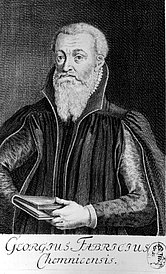Georg Fabricius facts for kids
Quick facts for kids
Georg Fabricius
|
|
|---|---|

Portrait of Georg Fabricus
|
|
| Born | 23 April 1516 Chemnitz, France |
| Died | 17 July 1571 (aged 55) Meissen, Germany |
Georg Fabricius (born Georg Goldschmidt; 23 April 1516 – 17 July 1571) was a German poet, historian, and archaeologist. He was a Protestant and wrote his works in Latin. He lived during a time known as the German Renaissance, which was a period of great artistic and scientific growth in Germany.
Contents
Early Life and Education
Georg Fabricius was born in Chemnitz, a city in Saxony, on April 23, 1516. His birth name was Georg Goldschmidt. He went to college at the University of Leipzig to get his education.
Travels and Discoveries
In 1546, Georg Fabricius became the headmaster, or rector, of a school called Saint Afra in Meissen.
He traveled to Italy with one of his students. While there, he spent a lot of time studying the ancient buildings and objects in Rome. These old things are called antiquities.
In 1549, Fabricius put together the first small collection of Roman inscriptions. These were texts carved into stone. This was a very important step in the study of epigraphy, which is the study of ancient writings. Fabricius showed how these old carvings could help people understand ancient laws. He proved that texts written on stone were just as important as texts written in books.
He later published more of his findings in a book called Roma. In this book, he carefully matched every old piece of the city he could find with mentions of them in ancient literature.
Writings and Music
Georg Fabricius wrote many books and poems. He was very careful in his religious poems to avoid any words that sounded like they came from pagan (non-Christian) religions. He even thought other poets were wrong for mentioning pagan gods.
Fabricius also encouraged music at his school. Even though he wasn't a musician himself, some of his writings were turned into songs by famous composers. These composers included Martin Agricola, Johann Walter, Mattheus Le Maistre, Antonio Scandello, and Wolfgang Figulus.
He wrote a lot, including poems, historical books, and studies of ancient texts. He also helped publish works by other famous writers like Vergil, Terence, Seneca, Horace, and Ovid, adding his own notes and explanations.
One famous quote from his writing is: "Death comes to all but great achievements raise a monument which shall endure until the sun grows old." This means that even though everyone dies, the great things people do can last forever.
Later Life
Georg Fabricius passed away in Meissen on July 17, 1571.
Images for kids
 | Sharif Bey |
 | Hale Woodruff |
 | Richmond Barthé |
 | Purvis Young |


